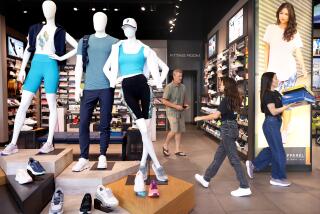Reebok Walks Marketing Tightrope With Human Rights Concert Tour
- Share via
Reebok has asked Bruce Springsteen a favor. What’s more, the athletic shoe maker has made the same request of such pop stars as Sting and Peter Gabriel. All are scheduled to perform during the multi-city “Human Rights Now!” concert tour this fall.
Reebok wants Springsteen and company to wear Reeboks while they’re on stage. Not Reebok T-shirts, jogging suits, or for that matter, sweat socks. Just Reebok tennies.
That might not sound like a very big deal. After all, Reebok is underwriting the expected $12-million cost of the concert tour to promote human rights. Still, Reebok can’t order Springsteen to wear its sneakers. It can only ask, nicely. That’s because Springsteen--who has rejected every corporate sponsorship ever waved in his multimillion dollar face--is donating his time.
For its part, Reebok still doesn’t know what sort of shoes the Boss will slip on his feet. And a New York spokesman for Springsteen--who is currently on tour in Europe--isn’t saying, either. But while the upcoming tour, organized by Amnesty International, is two months away, the sole sponsor, Reebok, finds itself walking a marketing tightrope.
On one hand, Reebok hopes to gain gobs of good publicity by spending millions of its advertising dollars to underwrite an event that has such lofty goals as freeing all political prisoners worldwide. But on the other hand, many of the singing stars who are taking part in concert tour generally don’t want to hear their names uttered in the same corporate breath with the likes of Reebok.
“The fact that Reebok is making this possible is important to get across,” said Joe LaBonte, president of Reebok, in an interview. “We’re a business entity, and for that I don’t apologize. But we also care about issues like human rights. So, this is not an occasion to blast the name Reebok all over the place.”
Instead, the Reebok name will be understated whenever--and wherever--it appears on the tour, that kicks off Sept. 2, in London and arrives in Los Angeles on Sept. 21. The Human Rights Now! logo that will hang above the stage will include only a relatively small citation that says, “Made Possible by the Reebok Foundation.” Likewise, when Reebok runs commercials for its sneakers on television, it won’t even mention that it is sponsoring the tour. Instead, it plans to run a special series of human rights issue ads that only mentions the Reebok name in passing.
Some advertising experts believe that Reebok’s marketing plans will fall on their face. Keep in mind, this is not something as straightforward as Pepsi paying Michael Jackson $10 million to use his name--and music--to promote its brand. Rather, a number of big name but independent-minded artists will be involved in this tour. Springsteen only recently announced that he would be part of it, long after Reebok agreed to sponsor the event. A few years ago, Springsteen turned down a $12-million offer from Lee A. Iacocca to sing patriotic praises for Chrysler Corp.
Now, Reebok finds itself in the odd position of picking up the tour’s tab, but still publicly taking a back seat to the musicians. “Regardless of the nobility of the cause, I don’t think I’d have ever approved it,” said Stephen Encarnacao, former vice president of marketing of Reebok and now executive vice president at Puma USA, a Framingham, Mass. rival athletic shoe maker. “If you over-commercialize, you offend the very people you are trying to reach. If you under-commercialize, you waste a lot of money. Any attempt to get major brand awareness out of this is fraught with risk.”
Those risks, however are no surprise to Reebok’s ad agency, Chiat/Day, which sold Reebok executives on the tour sponsorship. “Sure, it’s risky,” said Steve Mitgang, the ad firm’s New York-based account supervisor on the Reebok brand. “It is tricky and delicate and there are all sorts of artistic egos involved. But Reebok is a company that has built an image on risks. Why stop now?”
Indeed, experts in the field of music marketing say the sponsorship could turn out to be as big a hit for Reebok as the song “Born in the U.S.A.” was for Springsteen.
“It’s a backdoor association with Springsteen,” said David M. Rheins, editor of Marketing Through Music, a New York publication published by Rolling Stone. “Executives at Reebok must be rubbing their hands together. Reebok has unintentionally achieved an end run.”
But it is running very carefully.
“This is the first time Springsteen has had even a remote involvement with a corporate sponsor,” pointed out Jay Coleman, whose New York music marketing company, Rockbill, originally helped match Pepsi with Michael Jackson. “I have heard from corporations over the past 10 years that would have given their left arms to have any sort of involvement by Bruce. From a marketing standpoint, this is tremendous.”
The question remains: How will it affect Reebok’s sales? “No one is going to buy a Pepsi because they see Michael Jackson singing about it,” said Bob Guccione Jr., editor and publisher of Spin magazine. “But if someone sees Bruce singing near a Reebok sign, this tour could greatly improve Reebok’s image--and sales.”
Not that its sales need improving. Last year, Reebok posted net income of $155 million on sales of $1.38 billion. As the world’s most successful athletic shoe maker, it makes nearly one of every three pair of sneakers sold in the United States. “Keep in mind, the youth market is the athletic shoe market,” said Dick Silverman, editor of the trade publication Footwear News. “That is precisely who this tour will reach.”
Bilingual Magazine Targets Latino Teens
How do you get Latino teen-agers--and advertisers--interested in a new magazine?
Well, if you’re the creators of Que Pasa? (What’s Happening?)--a new magazine scheduled to hit the news stands next month--you carefully mix English and Spanish in the articles and advertisements. “These teen-agers want to integrate into American society,” said Lyle Landon, national advertising director. So, she said, most of articles will be written in English.
As for the advertisements, well, that’s a different story. About half the advertisements--including those from Coke and General Motors--will be in Spanish, said Landon. “Sometimes,” said Landon, “it can be more powerful to run an ad in Spanish.”
More to Read
The biggest entertainment stories
Get our big stories about Hollywood, film, television, music, arts, culture and more right in your inbox as soon as they publish.
You may occasionally receive promotional content from the Los Angeles Times.










